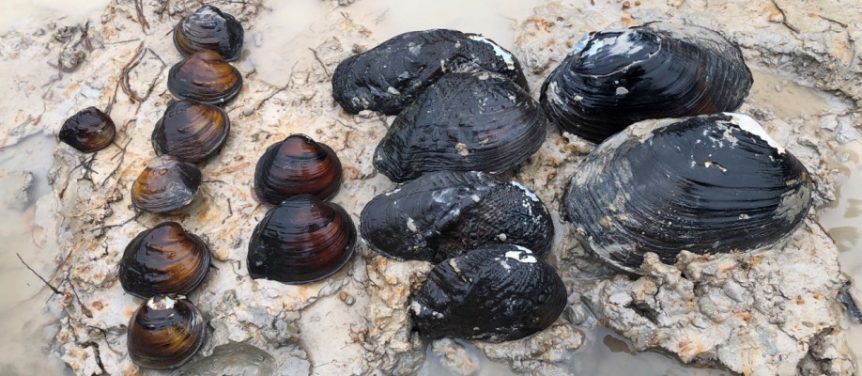The Sabine River Authority works with state and federal agencies to protect native species. Scientific data is the key to making informed decisions for the long-term health of any species. The studies, collaborations, and efforts to educate the public listed under this heading are just some of the ways the Sabine River Authority is making a positive impact for endangered, imperiled, and protected species in the Sabine Basin.
The SRA-TX will be studying native mussel populations on the Sabine River and its tributaries starting the summer of 2020. The Louisiana pigtoe and the Texas heelsplitter are two mussels of particular interest as they are the focus of the USFWS East Texas Mussel Species Status Assessment. The study is designed to supplement the available data on distribution and abundance of freshwater mussels in the basin. Genetic samples will be taken from a subset of mussels for species confirmation and to evaluate genetic diversity and structure, which will allow inferences about gene flow between populations of candidate species in the Sabine River basin. Genetic analyses will also allow for genotype by environment associations, allowing inferences about environmental parameters which can exert strong selection pressures on populations. In addition to distribution and abundance information, data on other population parameters such as population size, density, survival, longevity, and recruitment are needed to make an accurate assessment of conservation status. Mark recapture studies are an effective way to gather this information at specific locations through time. To evaluate these population parameters and provide for monitoring of populations through time, a minimum of two mark and recapture study sites will be established in areas occupied by the candidate species. These will be monitored using mark and recapture survey techniques to evaluate patterns in population parameters through time.
The Sabine River Authority of Texas began assisting University of Houston researchers in the study of the distribution and abundance of the western chicken turtle in 2020 providing GIS information and land access as needed. The western chicken turtle has historically occurred throughout East Texas but has had few observations in recent years. Despite its charismatic name, the current distribution and status of the species are not well understood. The US Fish and Wildlife Service is scheduled to make a listing decision for the species in 2024. Because of its broad historic range, understanding the current distribution of the western chicken turtle will help address important questions about the species. Researchers are using environmental DNA samples and live traps to search for the western chicken turtle. Researchers will compare the effectiveness of the various survey methodologies to provide future biologists and resource managers with tools to effectively find and monitor the species. Researchers will then combine these survey results and environmental characteristics with landscape-level habitat information to document the habitat types the turtle uses. The analysis will document known distribution and likely habitat across Texas.

